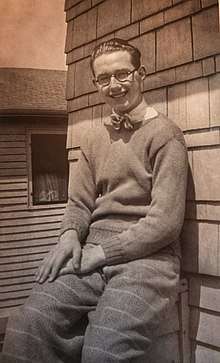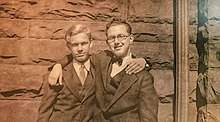Alonzo Hanagan
Alonzo Hanagan, known as "Lon of New York" was an American photographer during the 1940s and 1950s. He produced erotic images of men.[1]
Lon Hanagan | |
|---|---|
 Teenager Lon | |
| Born | 20 December 1911 |
| Died | 4 December 1999 |
| Nationality | American |
| Known for | Photography |
| Movement | Erotic Photography, Male Fitness Photography |
Biography
Early years

Alonzo James “Lon” Hanagan was born in 1911 in Lexington, Massachusetts, an oldest of Frank and Lizzie Hanagan three children. He had two younger sisters, Marry and Betty. Lon had a very religious family and grew up in a very strict and close family environment. The family had a piano and Lon played on it, imitating organist at the church, the family attended every Sunday. He started to work as a teen boy, with his first job was helping to deliver a fish from a local fish seller. In addition to playing music, he wrote and published some song himself as a teenager. His first published composition was "A Bunch of Good Fellows Are We", written for a musical, performed by "Good Fellows" group. He started to play piano and organ on a weekly radio program in Lexington at the age of sixteen. He also performed in local churches and events. He moved with his family to Lockport, New York, where his father was transferred to work at Jefferson Union Plant in 1928. Lon graduated from high school in Lockport in 1929.[2] In Lockport he worked as an organist at movie theaters. He befriended a local boy Ralph Ehmke, who became his first boyfriend.[3] Lon developed an interest in photography while a teenage boy, with his parents buying him a Kodak Box camera. He learned a darkroom skill in a boy scout camp in New Hampshire. His early photographs were images of his family and friends, endless snapshots of Ralph Ehmke. In camp he also made his first series of male nudes, photographing one of his adult camp counselors fresh from the shower.[4]
New York City
Lon decide to move to New York City in 1936. He studied music in Juilliard School and for some time worked as an organist at Radio City Music Hall. He rented his first apartment at 617 Weat 113th Street.[5] He continued to write and publish music in those years.[6]
Photography
At some point in his life he began to make photographs of athletes and bodybuilders.[7] He was known for using Greko-Romans esthetic in his photographic work. He mostly worked with Mediterranean, Latino and African American models, which was unusual in 1940-s, when most photographers preferred white models.[8]
Late years
Hanagan health declined in early nineties. He died in Lenox Hill Hospital in New York City on December 4, 1999, after a brief hospitalization.[9] His body was cremated and ashes were scattered at his mother's grave in Lockport.
Collections
Most of Lon of New York works were considered too "dirty" to be included in public collections during his career. Robert Mapplethorpe had some of Lon's works in his personal archive.[10] His work is also in the permanent collection of Leslie-Lohman Museum of Gay and Lesbian Art[11] and in Harry Weintraub Collection Of Gay-Related Photography And Historical Documentation of Cornell University Library.[12]
Exhibitions
Despite Hanagan was inactive in photography in the latter part of his life, his photographs were distributed in exhibited in the United States. Some of his images were exhibited as part of the group exhibition "Photoflexion" in Los Angeles Centre for Photographic studies in 1981 with images of Muybridge and Mapplethorpe. The exhibition attracted the attention of St. Martin's Press, which published its catalog as a book in 1984.[13] Lon's work was also exhibited in several exhibitions in the nineties, including "L'homme at Home: Male Nudes - 19th century to Present" in Throckmorton Fine Art gallery in New York City; "Male", curated by Vince Aletti in Wessel+O'Connor Gallery; "Bonding" in David Allen Gallery in Venice, California.[14]
References
- Massengill, Reed (2004). The Male Ideal: Lon of New York and the Masculine Physique. Universe. ISBN 978-0789309969.
- Massengill, Reed (2003). The male ideal: Lon of New York and Masculine Physique. New York City: Universe Books. p. 12. ISBN 978-0789309969.
- Massengill, Reed (2003). The male ideal: Lon of New York and Masculine Physique. New York City: Universe Books. p. 13. ISBN 978-0789309969.
- Massengill, Reed (2003). The male ideal: Lon of New York and Masculine Physique. New York City: Universe Books. p. 14. ISBN 978-0789309969.
- Massengill, Reed (2003). The male ideal: Lon of New York and Masculine Physique. New York City: Universe Books. p. 16. ISBN 978-0789309969.
- Catalog of Copyright Entries: Musical compositions, Part 3. Washington, DC: Library of Congress Copyright Office. 1937. p. 845.
- Krauss, Kenneth (2014). Male Beauty: Postwar Masculinity in Theater, Film, and Physique Magazines. SUNY Press. ISBN 9781438450025.
- "Lon of New York (1911-1999)". Retrieved 2019-01-06.
- Chapman, David. "Alonzo James "Lon" Hanagan 1911-1999" (PDF). Stark Center for Physical Culture and Sport. Retrieved 2019-01-19.
- Frances Terpak, Michelle Brunnick (2016). Robert Mapplethorpe: The Archive. Getty Research Institute. p. 222. ISBN 1606064703.
- "Hanagan, Alonzo James". Leslie-Lohman Museum of Gay and Lesbian Art. Retrieved 2019-01-19.
- "Harry H. Weintraub Collection Of Gay-Related Photography And Historical Documentation, 1850s-2010". Cornell University Library. Retrieved 2019-01-19.
- William Doan, Craig Dietz (1984). Photoflexion: A History of Bodybuilding Photography. New York City: St. Martin's Press. ISBN 978-0312608347.
- Massengill, Reed (2003). The male ideal: Lon of New York and Masculine Physique. New York City: Universe Books. p. 53. ISBN 978-0789309969.